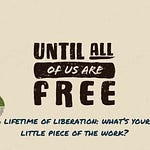In our last episode on Black Liberation and the Exploitation of Africa, the topic of consumerism came up a lot. Capitalism is a primary factor of exploitation, oppression, and violence around the world, and consumerism is often a major role that those of us in the Global North are expected to play in this global system of harm.
We cannot spend our way to liberation, but how we spend does matter, especially when it comes to the exploitation of Africa. So while there may be “no ethical consumption under capitalism” there is more and less ethical consumption. So while we do the big, real, important liberation work, let’s not ignore the important harm reduction role that more ethical consumption can play.
If you are trying to be more ethical in your consumption and aren’t sure where to start, here are some basics and ideas to get started with.
Some consumerism basics:
There are multiple levels of capitalist exploitation in the items we buy. Exploitation is often found on many different levels of the product lifecycle including:
How materials are sourced - the environmental impact and treatment of laborers sourcing materials, as well as political impact in regions sourcing materials
Environmental impact of manufacturing process
Worker treatment and compensation in manufacturing process
Worker treatment and compensation in delivery process
Environmental impact of shipping and delivery process
Environmental and community impact on land use for manufacturing and corporate real-estate
Environmental impact of product use and maintenance
The political and social impact of monetizing items that were once free or community owned (like water)
The political and social impact of the financial power of corporations when used for their own political or financial gain
The end-of-life environmental and social impact of the product and where it ends up as waste
All products produced for sale have a cost, and that cost doesn’t usually correlate to the price. All human labor matters, and the human labor of people in the Global South does not matter less than the labor of the Global North, even if corporations and politicians would like you to believe otherwise. The cost to environment matters, and it doesn’t matter less in the Global South than it does in the Global North.
It is impossible to make 100% ethical buying decisions all of the time. There is not enough time in the day to research every aspect of every thing we purchase, and even if we could, there would be plenty of items that we need that don’t have a 100% ethical choice. But what we can do, is make some key impactful decisions that are more in line with our ethics and the world we are trying to create, while we also do the important long-term liberation work targeting systems of oppression.
Capitalism creates needs that aren’t real - and are real - at the same time. Often, capitalism creates a product and then creates the need in order to sell it. We will have gone through most of our lives without these things and then they show up as novelties that only elites and maybe enthusiasts pick up, but then they are sold to larger companies or integrated into the systems or processes that we interact with regularly, and then before we know it, we actually do need these things in order to participate in many aspects of public life. It is important that we be aware of how this works, so that we can demand and support alternatives that preserve our access to vital services without increasing the products we need to do so.
Capitalism sells us products to help us endure…capitalism. Ever wonder why the self-care industry became an industry more tied with buying products and spending money than a movement dedicated to collective care and freedom from harm and exploitation? Well, because one puts the onus on us to heal from the ways capitalism harms us and will keep harming us using funds that we must earn by continuing to participate in exploitative capitalism, while the other pulls us from the grip of capitalism and gives us the strength to demand systemic change. One of the most powerfully oppressive tools of capitalism is the way in which it replaces our collective survival tools and skills with individualist products, to keep us tied to capitalism and make it harder for us to fight oppressive systems. It is vital that we break from this and return to more collective ways of meeting our needs.
Getting Started
Okay, so even that very very brief amount of info is a lot. And this can feel overwhelming. So let’s look at some things we can do right now to make an impact:
Buy less. This is really important in general to lessen the grip that capitalism has on us. Buy less, especially from larger corporations or from companies where you can’t verify the ethics of their practices and sourcing. Don’t fall for greenwashing or tactics to trick us into thinking that large corporations are “good” or care about us. They don’t. You can’t be an ethical large corporation, because ethics aren’t profitable on a scale that satisfies shareholders.
Treat the items you have like they took valuable labor to make - because they did - no matter how much they actually cost you in dollars. Fix things that are broken or need mending when you can.
Lend and borrow instead of buying, especially for items that you will not use regularly (our neighborhood has a tool library where communities can check out household tools instead of buying them, this is a fantastic example).
Repurpose items that no longer work for their originally intended purpose.
Go without - especially with impulse or emotional purchases. I often make a list of things I want to buy on impulse, I do my research and sometimes even add them to cart. Then I make myself wait. In the meantime I examine my emotions in the moment: am I feeling bored, stressed, sad? I try to address those core emotions while I wait. After a few days or weeks, if I am still thinking about that product I will try to find it second-hand or will buy it. But at least 70% of the time I’ve completely forgotten that I wanted to buy that item in the first place.
Join a boycott. Strategic boycotts are very important. They maximize the economic, social, and political impact of your buying decisions. They are so important that many governments have moved to ban them because they don’t want us leveraging that level of power. There are official boycotts designed to make specific political impacts (like the bds movement for Palestine) and there are smaller and more local boycotts you can join. There are even sites like buycott that list various boycotts, how many people are participating, and what companies are being boycotted. You can also find boycotts by linking up with the activist groups that are working on specific issues. So pick an issue or two and join up with others who are trying to use financial pressure to create real change.
Buy Better. First use what you have, then buy less, then buy better. This is the general order of operations for maximizing your impact for good - or, to put it another way - decreasing the negative impact of your consumption.
Buy from companies that care for the entire lifecycle of the products they sell. Products designed to have a lifecycle instead of just a lifespan are better choices. And companies who care about what happens to a product when it can no longer fulfill it’s original intended purpose deserve more support than those who don’t.
Buy local. Local, ethical, small businesses - especially those owned by people from marginalized communities - will always be a better choice than larger companies and will have a better overall impact on your immediate community.
Buy for long-term. Yes, many things made to last cost more (although, many things that are very expensive are just as poorly made and mass-produced as items that cost a lot less, so don’t let price alone be your guide), but where you can, invest in the best quality option possible for items that you will need for a long time - especially if those items have a steep environmental or human cost (like clothing, leather-goods, and technology).
Buy secondhand. I buy a lot of my clothing, shoes, and bags secondhand, and I buy almost all of my teenagers shoes and clothing secondhand. With the way he grows and the wild ways in which teenagers often treat their clothes and shoes, it just makes great economic and environmental sense. For cell phones, we try to repair any issues at local repair shops (teenagers with cracked screens, y’all). And when the phone absolutely must be replaced (like with a work phone I had to buy) I buy refurbished. My last phone came from BackMarket and it was a good buying experience that saved me money and reduced my contribution to the devastating impact of rising tech purchases).
How are you making more ethical consumption choices? Leave them in the comments below so we can all join in!
This Episode’s Amazing Contributors:
Francesca Eluhu: website | Instagram | bandcamp | YouTube
Aja Barber: website | Instagram | book - be sure to read her book for more on consumerism!
Alsarah: bandcamp | Instagram | music IG |
Where you can find more Until All Of Us Are Free
Ijeoma Oluo: website | Instagram | Behind the Book | Be A Revolution
This project is created and hosted by Ijeoma Oluo
Video and podcast produced by Isabel Khalili
Music produced by Gabriel Teodros: website | bandcamp | Instagram | substack












